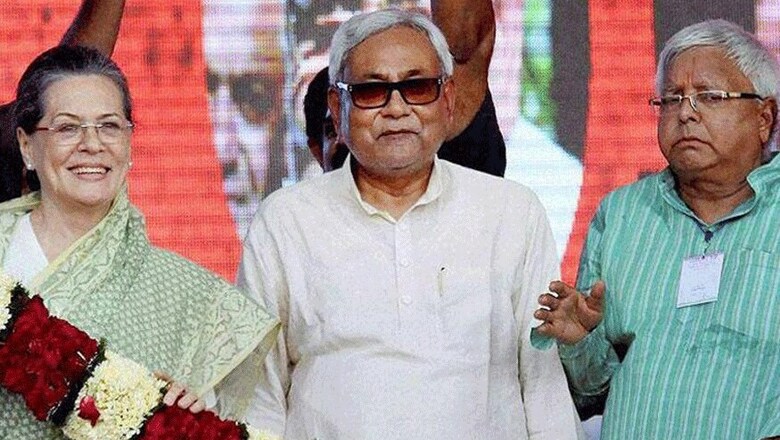
views
New Delhi: When historian Ramchandra Guha said last week that Nitish Kumar is a ‘genuine leader without a party’, a wide range of media debate followed on. I would read his comment as ‘Nitish Kumar is a national leader coming from a regional party’.
We, in JDU, are fully aware of the fact that our party has presence only in Bihar, Eastern UP and Jharkhand. But our leader has a vision for the nation and society, driven by constitutional morality, and has proven track record in governance and politics.
When one talks of Nitish Kumar as an alternative national leader, one has to understand his personality and background. A child of Jayaprakash Narayan movement, Nitish entered politics for a cause. That’s also the reason why he enjoys a clean image, even among his opponents, after four decades of political career and has kept his family away from public life.
What can be the bigger proof of someone being a great administrator than turnaround of a state like Bihar, which was once considered ‘Bimaru’? Nitish, through his hard work and perseverance, not only uplifted Bihar economically, but also focused on social justice to ensure that no caste or community was left behind.
Under his government 95,000 criminals, regardless of their party affiliation, were convicted in courts, helping the state get rid of organised crime.
Gender justice is a natural component of Nitish’s commitment for social justice. Despite numerous campaigns, Lok Sabha has just about 10% women members, while Nitish ensured 50% reservation for women in Panchayati Raj institutions and 35% reservation in government jobs. This grass root empowerment of women in a feudal state like Bihar is strengthened by schemes like distribution of free cycles and dress to school girls.
In 2015 Bihar Assembly election, Nitish realised that something far bigger than personal or party performance was at stake. This could be seen from the way he has led Mahagathbandhan, before polls and after coming to power.
Everyone in Bihar knows that Nitish’s goodwill was the prime reason why Mahagathbandhan won. But despite being in such a strong position, Nitish exhibited statesmanship by giving more seats to alliance partners, particularly Congress, than most observers deemed reasonable. For those who know him, it was not surprising at all — he always walks extra mile to be fair.
Like always, he fought Bihar polls on issues of principles and governance even when the opponents tried to drag down the debate. At no point did he utter a single word which could be seen discomforting, leave alone controversial.
Few months into power, when allegations against some of his alliance partners came to the fore, JDU categorically stated that each question should be answered transparently. That’s because Nitish believes in probity and clean politics.
This was clearly seen during his last tenure when he introduced a law to seize property of corrupt officials, turning it into public service institutions. Many states have tried to follow it since then.
Some people may ask why Nitish is continuing to run government with an alliance partner who is facing allegations of corruption.
Nitish has stated from day one that each allegation must be explained, but he also has to show patience and dignity during investigation.
It may sound complex to some but Nitish, a follower of Buddha’s Madhyam Marg, has the unique ability to practice coalition dharma while having zero tolerance for corruption.
I would also like to clearly mention here that if someone from JDU was facing charges of graft, Nitish would have taken a strict decision on day one. We have seen many such instances when people perceived to be powerful in political or bureaucratic circles were made to resign in light of corruption charges.
But coalition has its own principles. During his alliance government with BJP also, Nitish followed the same norm — he acted first against his own people and then patiently and persistently ensured that the coalition partner also followed probity in public life.
A leader with such maturity and vision can lead a coalition at the national level. This is important because if an alternate has to emerge to the ruling party, it has to be through a partnership of secular and progressive forces.
Those who doubt Nitish’s credentials in industrial development, compared with states like Tamil Nadu or Gujarat, should remember that Bihar is a landlocked state with high population and small landholdings. Bihar was discriminated against as some sort of internal colony of India and a much deserved special status was denied.
Remember, when Jharkhand was separated, Bihar lost its only strength — natural resources. Despite these limitations, Bihar’s industrial growth under Nitish has been in double digits. In 2013, an expert report on industrial development dedicated an entire chapter to Bihar’s development model.
Nitish practices what Amartya Sen describes as human-centric development. He believes development and social justice can’t be separated. It’s only this kind of development that can bring peace and harmony. I would urge social scientists across world to study how Naxalism and caste wars have nearly disappeared from Bihar ever since Nitish has governed the state. And none of this was done by using brutal police power, but through effective developmental schemes.
Once again, I ask, if a leader can achieve so much under severe limitations, imagine wonders that he can do if given an opportunity to take forward the economy of India.
Trust is another big factor. Nitish as leader doesn’t believe in manipulating people through emotive speeches. Even in election rallies he speaks in a measured tone and talks about issues in depth. This may not make for sensational headlines but helps in building confidence among people.
Today, when the country faces serious challenge due to divisive forces, Opposition needs to come together. From violence in the name of cow to agrarian crisis, from caste violence to joblessness, the country needs a credible leader. Congress, being the largest party, should take a lead on this front.
(Author is Rajya Sabha MP and former editor of Hindi daily Prabhat Khabar)

















Comments
0 comment